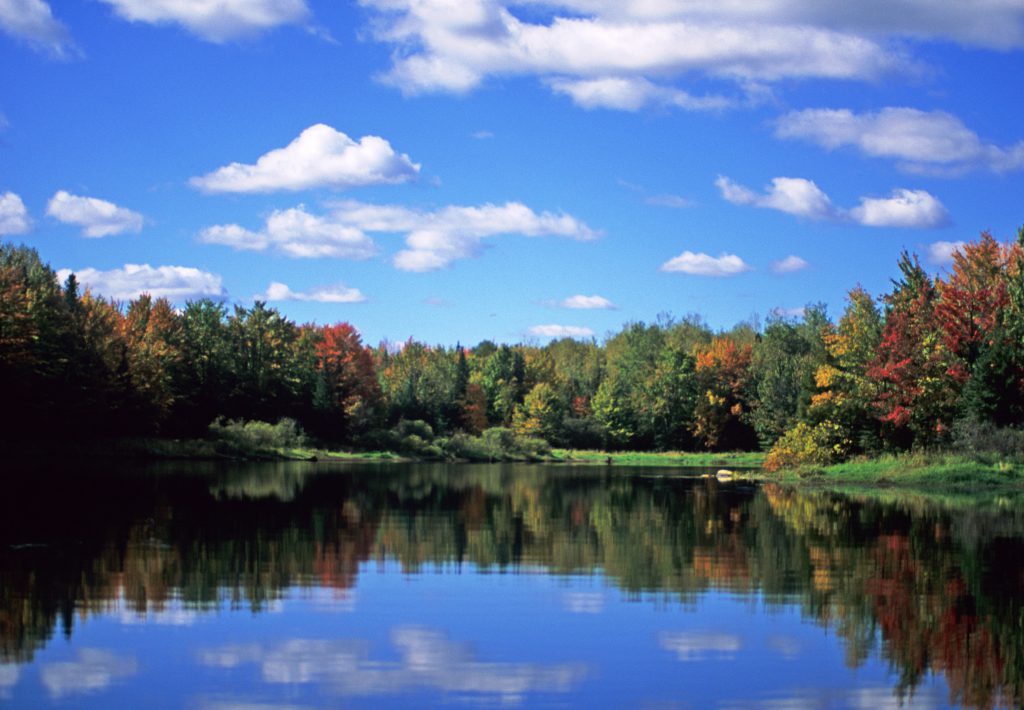Budget Committee Debates Stewardship Program
Funding for preserving land has been slashed by 61% in last 12 years. State Sen Tiffany wants more cuts.

Willow Flowage Scenic Waters Area. Photo from the Wisconsin Department of Natural Resources (CC BY-ND 2.0)
The Joint Committee on Finance will take up funding for the Wisconsin Department of Natural Resources on Tuesday, which will include whether to reauthorize the state’s land purchase program.
Gov. Tony Evers has proposed reauthorizing bonding for the Knowles-Nelson Stewardship Program in the short-term as some Republican lawmakers have argued against continued funding.
The program was created in 1989 to buy land and expand recreational opportunities. Since then, the DNR has purchased more than 669,000 acres through the program as of last June, according to the nonpartisan Legislative Fiscal Bureau.
Supporters want to see the land purchase program reauthorized for another decade. However, its annual bonding has been cut in the last dozen years from $86 million to $33.25 million as lawmakers have questioned whether the program spends too much for the return on investment.
Evers’ budget would reauthorize the program through fiscal year 2021-2022. State Sen. Tom Tiffany, R-Minocqua, who serves on the state’s budget-writing committee, said legislators should “take a time out” on funding.
Under current levels, the program would cost more than $533 million if reauthorized assuming all funds are committed each year for land purchases and a 5 percent interest rate, according to the fiscal bureau. However, the state has not utilized its total bonding authority annually under the program.
Since 1992, the state has paid more than $871 million in debt service on the program. It currently owes around $795 million in debt service for the program over the next 20 years.
Tiffany said the state should devote bonding to more pressing concerns related to roads and infrastructure, citing the governor’s declaration of 2019 as the year of clean water.
“If we’re going to continue to authorize funding for the stewardship program, let’s shift that money to what I believe is a higher stewardship purpose and that is to have clean water in Wisconsin,” said Tiffany.
Supporters of the program argue there’s more work to be done to protect Wisconsin lands, contending public lands are vital to the state’s $18 billion outdoor recreational industry and $24 billion forest economy. Wisconsin lags behind neighboring states in land protection with about 17 percent of state land set aside for conservation, said Matt Dallman, deputy state director of the Nature Conservancy in Wisconsin.
“Taking a time out is essentially a loss of opportunity, and we have to acknowledge that the stewardship program is real money,” said Dallman. “But if you put it in the context of the overall state debt, we’re talking about 2 percent of the overall state debt.”
The state paid roughly $80 million in debt service for the program in the last fiscal year. Dallman said that amounts to each Wisconsin resident paying about $15 per year to conserve and protect land. He added Evers’ proposal to reauthorize bonding for the program in the short-term is inadequate when crafting large land deals with timber companies that may take multiple years.
Timber companies and paper mills have sold off large tracts of industrial forest land in the state over the last 30 years, according to Tom Hittle, a senior vice president with forestry and real estate consultant Steigerwaldt Land Services, Inc. He said conservation easements under the stewardship program have helped keep forest lands in production and prevent fragmentation.
“If the state doesn’t retain those rights or acquire those rights for those land sales, eventually we’ll see more of those 40s and 80s (acre parcels) just kind of churn off of these longer blocks,” said Hittle.
A recent national study found Wisconsin led the Midwest with around 16.5 million acres of timber land, of which 4.7 million acres are public land. Some of the state’s largest land purchases include around 73,000 acres for the Brule-St. Croix Legacy Forest and nearly 21,000 acres in Sawyer County to preserve land for public use and timber production.
Evers spokeswoman Melissa Baldauff said the governor supports reauthorizing the program for 10 years, but is seeking a bipartisan solution.
“The governor has always supported this program and wants to make sure that it’s going to be sustainable and can thrive for generations to come,” said Baldauff. “We wanted to make sure in this budget that we established a process that would let stakeholders come together in a bipartisan way to ensure that there was going to be the funding necessary to continue the program.”
Still, Tiffany voiced concerns about taking more private land off the tax roll in communities across the state.
“When you look at the counties for northern Wisconsin, which many have 30 or 40 percent or more of their land that’s publicly owned, they have very little opportunity to expand their tax rolls,” said Tiffany.
The DNR can’t acquire land through the stewardship program without majority approval of a county board if two-thirds of the county’s land is publicly owned.
Around 1.8 million acres have been protected in Wisconsin. The state has set a goal to acquire around 2.2 million acres of land.
Listen to the WPR report here.
Budget Committee To Take On Funding For State’s Stewardship Program was originally published by Wisconsin Public Radio.
More about the 2019-2021 Wisconsin Budget
- State Budget Fell Short on Highways? - Laurel White - Jul 8th, 2019
- Rep. LaKeshia Myers Supports Governor Evers’ Partial Vetoes - State Rep. LaKeshia Myers - Jul 3rd, 2019
- Statement: Wisconsin’s biennial budget will speed up transition to electric vehicles and improve public transit - WISPIRG Foundation - Jul 3rd, 2019
- Majority Leader Fitzgerald Reacts to Governor Evers Signing the Wisconsin Budget - U.S. Rep. Scott Fitzgerald - Jul 3rd, 2019
- Evers Uses 78 Partial Vetoes on Budget - Laurel White - Jul 3rd, 2019
- Rep. Bowen Statement on Gov. Evers’ Signing of Biennial Budget - State Rep. David Bowen - Jul 3rd, 2019
- Promises Made, Promises Kept: Gov. Evers Signs Wisconsin’s 2019-21 Biennial Budget into Law - Gov. Tony Evers - Jul 3rd, 2019
- Budget Bill The Shortest in Decades - Shawn Johnson - Jun 30th, 2019
- Op Ed: Budget Should Plan For the Future - State Sen. Jennifer Shilling - Jun 29th, 2019
- Majority Leader Fitzgerald Statement on the Passage of the Wisconsin Budget - U.S. Rep. Scott Fitzgerald - Jun 26th, 2019
Read more about 2019-2021 Wisconsin Budget here



















